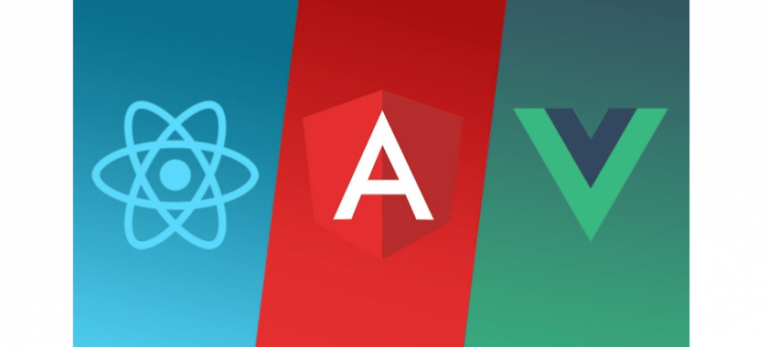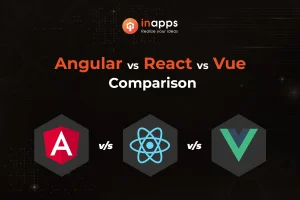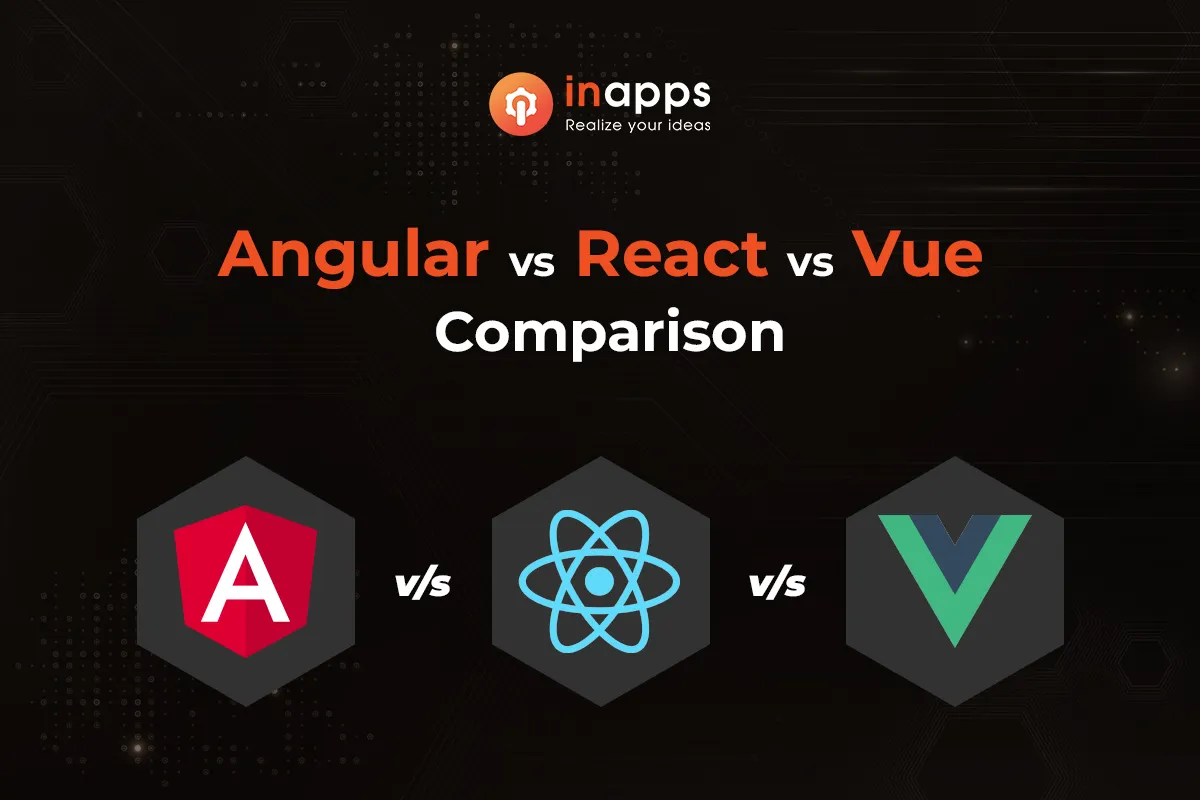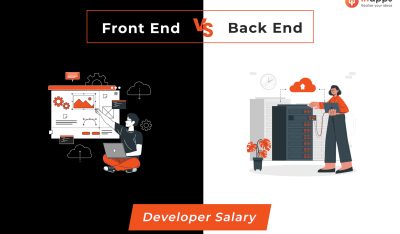React emerged as the frontrunner in the front-end frameworks competition last year, putting Angular far behind. But, maybe more crucially, Vue emerged as the winner. It gained its market share through substantial growth and many downloads.

Before starting the comparison between the frameworks, let us have a quick review of Javascript. Javascript is a programming language. It is the most preferred language for web development. The user interface of websites is made by using Javascript. People have a higher chance of recruitment if they have knowledge of Javascript as well as Javascript frameworks.
Javascript Frameworks are of two types:
- Front-end Frameworks
- Back-end Frameworks.
Now that you’ve examined the fundamental concept of the Javascript Frameworks, we’ll begin the comparison by describing each framework:
Comparison between frameworks
1. Angular

Angular is an open-source, free-for-all Javascript Framework developed by Google. It is the oldest framework currently available on the market and is widely regarded as the most excellent framework for front-end frameworks.
AngularJS was introduced Angular in 2010. However, owing to shifting market trends, it missed several crucial characteristics. As a result, a significant transition occurred in 2016 when Angular2 was released, with significant changes from prior versions.
Angular 8 is the most recent version, which has decreased latency and promoted quicker compilation of Angular apps by leveraging Ivy, a new compiler for Angular projects. It has also reduced the size of its package.
Advantages of Angular:
- It is very easy to develop applications in Angular.
- Angular can distribute a single block into multiple blocks. Hence, gives the developer the ease to act on the components individually.
- Angular enjoys large community support since it is the oldest framework available.
- Since it has a component-based structure, its components can be used again.
- The programming quality on Angular is very high, thus it gives good programming feel to the programmers.
- It consists of built-in functionalities.
Disadvantages of Angular:
- It requires a lot of learning and study because of its complex syntax.
- Angular consists of a steep learning curve.
2. React

React is a Javascript library introduced in 2013 by Facebook and maintained by a vast community of users and developers. React quickly gained popularity among the general public after its initial release.
It was constantly giving tough competition to Angular and the breaking point came in November 2019, when it recorded the highest number of downloads. It has been the market leader from its day of release.
Many businesses rely on it as their principal framework tool. The Virtual Document Object Model usage is a key element of React (DOM). In terms of HTML, the DOM is the basic representation of nodes. It employs the JSX (Javascript XML) extension, allowing users to write HTML in React, making it simple to create apps.
React is easy to code if you understand the fundamentals of Javascript, and other versions of React, such as React Native, are used to create mobile applications. Furthermore, these Javascript libraries aid in speed enhancement by implementing reusable code.
Advantages of React:
- It has many tools that allow the developer to play with it and make changes.
- React enjoys good community support and developers and users keep contributing to it to maintain its relevance.
- React has an easy learning curve and it doesn’t require complex study for coding on it.
- It has high efficiency and flexibility. Due to this, its performance improves.
Disadvantages of React:
- React doesn’t have an easy programming style so it is not understood by many.
- React uses JSX, instead of HTML.
- React focuses on creating UIs. Thus, you’ll need third-party libraries to make it.
3. Vue

Vue is one of many front-end frameworks of Javascript Frameworks used for improving web page interfaces. Vue was released six years ago and is developed by Evan You, a former developer at Google.
While working on Angular, he noticed how heavy Angular was as it consumed a lot of power. This resulted in poor performance, so he thought of developing a lighter framework that yields higher performances.
He turned his expectation into reality. At 20KB, Vue is the lightest framework and it results in a bloat-less experience.
Advantages of Vue:
- Vue is the lightest framework at 20KB and is simple to work with.
- It integrates with other programming languages very easily.
- It is easier to work on Vue since it has an easy learning curve.
- Vue gives faster performance due to its small size.
- Users have started switching over to it over other options.
- It has good documentation.
Disadvantages of Vue:
- It has a small community of users and developers in comparison to React and Angular.
- It is not very flexible when teaming up with large projects.
- Vue has very limited features.
Comparison between React vs Angular vs Vue

- The number of downloads – For comparison based on downloads, we would need to refer to a graph.
As is visible from the graph, React is the most downloaded framework of the three. These many downloads show the confidence of users in React. Vue comes second by a long distance, surpassing Angular.
Also, it shows that users are moving towards Vue very fast and Angular comes a distinct third. This shows that new users are not keen on using Angular and they prefer Vue and React over Angular.
- Learning Curve – The Learning curve is defined as the basic study you need to do before starting a framework. For Angular, the learning curve is steep because you need to learn about concepts like Model View Control(MWC). You need to know about TypeScript. It is necessary to know these concepts for advanced coding. React requires a less steep curve than Angular since it works on Javascript. It supports third-party libraries, which ease the curve. However, it requires a study about JSX to do coding. Vue has an easy learning curve. This is because it is simple and doesn’t have complex code.
- Framework Size – When it comes to the framework, the size of the libraries becomes an important characteristic. This is because runtime depends on the size. Angular consists of the framework of the largest size at 500KB. React comes second at 100KB. Vue is the lightest at 80KB(Bundle size).
- Community Support – React and Angular has the largest community support because of the support from Facebook and Google respectively. They are regularly updated with one major update in six months. Vue, on the other hand, doesn’t have a huge community like React or Angular.
- Configuration – Angular is a framework based on TypeScript. React consists of Javascript libraries. Vue is a convenient, simple-to-code Javascript framework.
- Languages used – Coding on Angular is done through TypeScript whereas Vue and React work on Javascript.
FAQ
Is Vue worth learning?
Vue.js is unquestionably more straightforward to understand than Angular or React, yet its performance speed is comparable to the other two. Moving from jQuery or ordinary JavaScript to Vue is also reasonably straightforward. However, it does not have the same economic traction as other prominent frameworks.
It is unlikely that it will attain the success that React and Angular have. Instead, this has nothing to do with its quality with the firms that support React and Angular (Facebook and Google both love working with large companies).
As a result, Vue.js is unlikely to be as in demand as the other two. Learning it is still a good idea because your abilities will almost certainly be transferrable to React or Angular. After all, few businesses are looking for specialized frameworks. They are primarily concerned with broad front-end abilities. So your best choice is to create an excellent demo app or join a Github project to demonstrate what you’ve learned.
One of the most prominent features of Vue.js is the low barrier to entry for folks who are just getting started with front-end web development. It may replace simple jQuery scripts without using module-bundlers and grow up to construct full-fledged SPAs with PWA and server rendering capabilities. On the other hand, Vue appears to be more of a ‘seeing forward’ skill for the time being. That means there aren’t as many job openings for Vue developers right now as for React or Angular, but its recent popularity will likely lead to more firms adopting it.
Is Angular worth learning?
It offers an entirely client-side solution. On the client-side, you may utilize AngularJS to generate dynamic web pages.
It offers declarative templates, dependency injection, end-to-end tools, and integrated best practices to address typical client-side development difficulties.
Because Google is behind Angular, you can be confident in its speed and regular upgrades. I am convinced that AngularJS is here to stay. Thus investing effort in it is entirely reasonable.
Is React worth learning?
Another JavaScript package or framework for creating user interfaces is React. It’s similar to Angular, except it’s supported by Facebook, Instagram, and a community of individual developers and organizations. It enables web developers to build massive online apps that may change over time without restarting the page.
It is up to you to select between Angular and React in web development. Circumstances often determine it; for example, you must understand React if you are working on a React-based project.
Conclusion
All the three frameworks compared are good but what you prefer is entirely up to you as per the specific needs of your project’s needs. Each framework comes with its own set of advantages and disadvantages and their usage depends on how you want to use these front-end frameworks.
So, to make the framework selection easy for you, we have made some quick short points for you:
- If you love coding in Javascript, then React is the best option for you.
- If you love good performance and a bloat-free experience, then you should go for Vue.
- Angular would be preferable for you if you like (OOPs) object-oriented programming.
Looking to hire well-experienced professionals in Angular, React, or Vue? Go to InApps right now to find yourself some of the most well-versed individuals in the industry.
Let’s create the next big thing together!
Coming together is a beginning. Keeping together is progress. Working together is success.



















